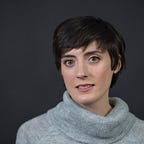Meet the 2021–2022 Georg Arnhold Fellows
The Georg Arnhold Scholarship, a partnership between the IRC’s Airbel Impact Lab and the Georg Eckert Institute’s Georg Arnhold Program on Education for Sustainable Peace, was established in 2020 to bridge the gap between research and practice. Through this initiative, selected researchers work closely with IRC staff in undertaking work to further both the interest of the IRC and the fellow. The fellowship provides an opportunity for researchers to bring their research, theories, and methods into the field, to develop new methods, and to learn from IRC’s ongoing projects.
This year’s fellowship program kicked off at the 2021 Georg Arnhold Summer Conference, which included an incubator session with Airbel designers. Participants in the incubator session were shortlisted and interviewed by a panel of IRC staff, including the supervisors for their potential research. Two individuals were then selected to undertake fellowships with the IRC and will be conducting their research December 2021 through February 2022. We are pleased to introduce our second cohort of fellows:
Michael Chew
Rotary Peace Fellow, Chulalongkorn University
Dr. Michael Chew is a participatory action-researcher, photographer and environmentalist whose work explores creativity in social change. He draws from interdisciplinary perspectives with degrees in Participatory Design, Mathematical Physics, Social Theory, Art Photography and Social Ecology. He co-founded grassroots NGOs Friends of Kolkata and Friends of Bangladesh to run international volunteer programmes and North-South solidarity work, and has run participatory storytelling projects across Asia. After completing a design-based action-research PhD in 2020 exploring how participatory photography can inspire youth environmental behaviour change across cities in Bangladesh, China and Australia, he is currently undertaking a Rotary Peace Fellowship at Chulalongkorn University, Thailand.
As a Georg Arnhold Fellow, Michael will analyze quantitative and qualitative data and insights produced from recent design research focused on seed security conducted in Northeast Syria, Niger, and South Sudan and produce three distinct seed security solutions reports. The reports will analyze and summarize the existing desk review, data, and design insights and put forth recommendations for programming interventions moving forward. These reports will ultimately be delivered to country program staff to help guide programming and planning within climate resilience and seed security. Michael will additionally research best practices in participatory tools for data collection and training and scope/design a tool for potential inclusion in a prototype for a seed security solution.
Munir Moosa Sadruddin
SMI University
Dr. Munir Moosa has been working as an Assistant Professor of Education at SMI University, Pakistan for the last nine years. He is also a founding volunteer director of Global Forum for Teacher Educators, the recipient of the Presidency of Turks and Related Communities Research Fellowship and the Commonwealth UK Distance Education Scholarship, and has served as a Visiting Academic Scholar at both the Humboldt University of Berlin and the University of California, Berkeley. Through this work he has developed a series of socio-eco-ethical models with global application in human rights education, social work, and inclusivity. Munir is a human rights educator, social and educational counselor, social anthropologist, self-determined learning practitioner, mental health educator, and socio-educational theorist.
As a Georg Arnhold Fellow, Munir will analyze quantitative and qualitative data and insights produced from recent design research focused on seed security conducted in Pakistan and produce a seed security solutions report. The report will analyze and summarize the existing desk review, data, and design insights and put forth recommendations for programming interventions moving forward. This report will ultimately be delivered to country program staff to help guide programming and planning within climate resilience and seed security. Munir will additionally conduct a desk review and produce a report on best practices in seed variety education and training in fragile contexts. This report will support ongoing prototyping of a seed security solution, as well as longer term planning related to access to information.
